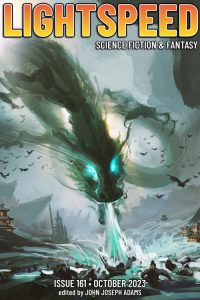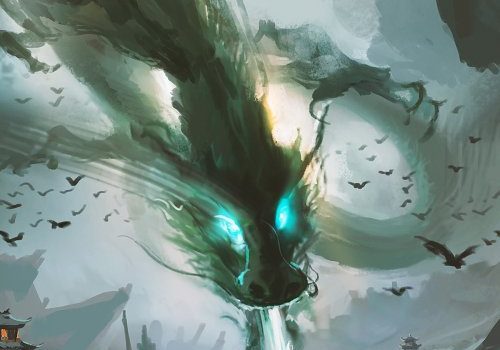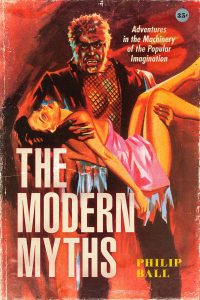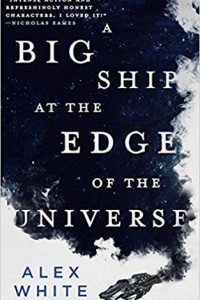Charles Payseur Reviews Short Fiction: Strange Horizons, Lightspeed, Fiyah and Kaleidotrope
 Strange Horizons 9/18/23, 9/25/23, 10/2/23, 10/9/23, 10/16/23
Strange Horizons 9/18/23, 9/25/23, 10/2/23, 10/9/23, 10/16/23
Lightspeed 10/23
Fiyah 10/23
Kaleidotrope 10/23
Strange Horizons closed out September with some memorable poetry, including Bob Hicok’s “No stones”, which lingers on the image of “dirt birds” – the marks left behind when birds impact glass. As the title might imply, the poem places the narrator (and readers) inside glass houses, fragile but solid enough to withstand these small impacts and over time dotted with the marks of birds that collided, lingered, and faded. Hicok positions these impacts as moments of inspiration, confrontation, and growth, leaving the narrator – and, by extension, all of us who live in glass houses – moved and altered without being shattered. The language draws into the sadness of these moments, the deaths that the impacts represent, while finding hope in the change that is provoked, the lives challenged and enriched. R.B. Lemberg returns as well with “Firebird, Stormbird”, which also looks at change (and birds). The poem follows a firebird that has been drowned in an attempt to steal and seal its power away. Except instead of being destroyed, the bird is transformed and finds ways to draw new power and life from the very storm that was used to try and suppress it. Rather than shrinking, the stormbird rises with a will that shakes the world, defiant in the face of those that wanted its erasure, reborn as a new force of nature, unable to be attacked or restricted in the same way again.
Moving into October and Strange Horizons’ fiction, Ten Tzeng’s novelette “Black Are the Waters” explores grief and loss as Oona, a selkie, deals with the sudden death of her father and the cultural rituals it brings – rituals that she tries her best to reject. At the surface, she grounds her aversion in logic and dignity, not wanting to put on a show for the humans who view their ways as exotic and fascinating. Under that, though, is her own guilt and desire to avoid the pain she feels, the helplessness she can’t avoid if she faces what’s happened. But being a selkie requires being aware of the shadows around you that might be sharks, and Oona’s desire to not see the magnitude of her loss threatens to leave her vulnerable to predators. Tzeng packs the story with emotion, the tension between Oona and her family, and the danger waiting for her outside the safety of her people. Charlie Valenti continues the focus on the push and pull of grief and possibility in “Grey Hands, Green Sky”, which finds the narrator meeting up with their friend, Saga, after she’s experienced a transformation. The world has fractured, leaving cracks into other places, and Saga slipped through one such to find a way to become a kind of monster, but one she fully desires to be. The narrator, though, with their unspoken love, finds that the future they yearned for with Saga is slipping away – a bittersweet moment that Valenti captures wonderfully. The narrator struggles with their feelings but never blames Saga for her decision or her changes, and the story glows with warmth as the two acknowledge what they need and what they feel for each other, which is messy and complicated and deeply realistic, and makes for a fantastic read.
October’s Lightspeed opens strongly with A.L. Goldfuss’s “Where the God-Knives Tread”, which finds Sien, a voidborn person adrift following the automation of the ship xe was crewing, falling in with a Preservationist named Jaks, whose mission is to find the secrets of a long-dead empire. Those secrets, though, are also the target of a contemporary company that has found a way to mine them for technological advancements (and monopolies). When Sien and Jaks find what might be the greatest historical find of all time, the intact imperial pleasure flagship itself, it’s an opportunity that could bring the two together, or tear them apart. Goldfuss does careful and impressive work building up the setting and characters, and Sien’s exploration of the ship – and xir internal struggles with wanting to help Jaks escape the grind of their obscurity – is intense and tightly paced and very much worth checking out. In the fantasy half of the issue, Oluwatomiwa Ajeigbe returns with “Immortality Soup, Or, An Excerpt from the Cookbook of the Gods”, in which a trickster god advises demigods (but definitely not mortals) on one way to achieve immortality. Framed as a rather cheeky recipe, and with a hardly reliable narrator, the piece reveals the secret ingredients of godhood, all the while showing us a pantheon of beings full of power and petty agendas. Ajeigbe’s conversational tone keeps things fun and quick-moving, and yet under that there is a lingering revelation of loneliness and intelligence that gives layers to the mischievous narrator whose true message is in playful subtext. It’s a delightful read.
Belonging is the theme of the October Fiyah, and it opens with K.S. Walker’s strange but captivating “Moonlight and Needle Teeth”, which looks at people who are born possum-things but are able to mostly pass among humans. For Birdie, though, that meant the removal of their tail and a constant looking over their shoulder. When a less humanoid possum-thing turns up near their home, it also means relocating the interloper lest they bring unwanted attention. Unfortunately, it’s during the relocation that they are noticed by another possum-thing like them, Nell, who brings something Birdie has been missing for a long time – company. The story is tender and warm, the conflict centering on Birdie’s hurt and trust issues, bringing them to a place where they can confront their past and perhaps even think about the future. It’s deeply weird but very good. The weirdness continues with Shawn Frazier’s “Water Walkers”, in which seven members of the United States Colored Troops fighting during the American Civil War jumped into a river rather than give up to Confederate forces. Two of them, Adam and Steven, remained there, adapting to the water and free at last to embrace their sexuality and each other away from the judgments and dangers that followed them through their lives. Caught in time, they live on in the murky water, and over time contemplate a return to the surface, to the fight they left and the open love they fear they’ll never be able to experience. Frazier grounds his time-bending plot in a deeply moving study of his characters and their hesitations. They have reasons for wanting to stay forever safe under the waves, but there is something about being able to live honestly in the world that draws them, pulling them back to the surface and undoing their erasure by history. In the poetry of the issue, “Defiling Stone” by Jarred Thompson looks at a wall and imagines what might be on the other side. The wall seems to be part scripture, part prejudice – the things that keep people divided by hard lines – that demands binaries, especially with regards to gender. But the “theys,” nonbinary people who have scaled the wall, are spreading the word that there is something beyond, and it’s worth toppling the wall to reach it. Because for all that the wall is posited as being protective, it’s much more restrictive than anything, and a freedom is waiting for those who can imagine a place and a future where people can be more than the limited roles determined by the preconceptions of others. Thompson’s work is bold and much appreciated.
October brought a new issue of Kaleidotrope with ten new stories, including “The Girl with Starlight Hair” by Jennifer Shelby, which features Maya, a girl who grows up hearing the story of a planet that has taken the form of girl, who carries her dying star with her through this alien land, fed and cared for by a secret society of women who keep her secret. The story sparks an unquenchable curiosity in Maya, and when she discovers firsthand that the story is real, and that this planet/girl is in growing danger as the wild spaces of Maya’s world dwindle, she decides she has to act. Shelby mixes science and fantasy to lovely and moving effect, creating a love story that begins in loneliness and ends in something magical and alive and joyous. Timothy Mudie also lingers on stories that inspire children’s imaginations that turn out to be real in “Kids Who Love Dinosaurs”, which takes childhood fascination with prehistoric reptiles and crosses it with portal fantasy. In it, Caryn spent a year in the land of the Toothed-Ones with her sister, Lexi, who unceremoniously kicked her back to Earth. Ever since, Caryn has been seeking a way back to the wondrous land she lost, and when she meets a child who might be on the verge of being recruited by the Toothed-Ones as well, she knows she’s found her chance. Mudie confronts the allure of portals, the trusting nature of children, and the harsh realities waiting out there for those who don’t recognize predators when they see them. The result is a story that twists expectations but doesn’t wallow in tragedy, reacting to the betrayal of childhood innocence with a defiant push for justice that’s incredibly fun to read. Moving to the issue’s poetry, Angel Leal’s “Animals That Pretend to Be Islands” also touches on what happens when people refuse to see the dangers of a place they come to in a time of need. The poem follows a people made refugees on a wide ocean who find a place to settle – on the back of a great animal. And despite knowing that it’s an animal, they pretend that they can have a home there, because the alternative is difficult to face. But Leal shows how it can’t be avoided, and pretending that it’s a solution not only leads to a lack of preparation, it also fails to fully appreciate how an animal isn’t an island – but it can be a home for a while, can grant rest and reprieve in an uncertain world.
Recommended Stories:
“Grey Hands, Green Sky”, Charlie Valenti (Strange Horizons 10/23)
“Where the God-Knives Tread”, A.L. Goldfuss (Lightspeed 10/23)
“Immortality Soup, Or, An Excerpt from the Cookbook of the Gods”, Oluwatomiwa Ajeigbe (Lightspeed 10/23)
“Moonlight and Needle Teeth”, K.S. Walker (Fiyah 10/23)
“On Fallow Fields Where Flames Once Bloomed”, N.A. Blair (Strange Horizons 10/23)
“Brincando Charcos (Jumping Puddles)”, Ben Francisco (Strange Horizons 10/23)
“A Record of Lost Time”, Regina Kanyu Wang (Lightspeed 11/23)
Charles Payseur is an avid reader, writer, and reviewer of speculative fiction. His works have appeared in The Best American Science Fiction and Fantasy, Lightspeed Magazine, and Beneath Ceaseless Skies, among others, and many are included in his debut collection, The Burning Day and Other Strange Stories (Lethe Press 2021). He is the series editor of We’re Here: The Best Queer Speculative Fiction (Neon Hemlock Press) and a multiple-time Hugo and Ignyte Award finalist for his work at Quick Sip Reviews. When not drunkenly discussing Goosebumps, X-Men comic books, and his cats on his Patreon (/quicksipreviews) and Twitter (@ClowderofTwo), he can probably found raising a beer with his husband, Matt, in their home in Eau Claire, Wisconsin.
This review and more like it in the December and January 2023 issue of Locus.
 While you are here, please take a moment to support Locus with a one-time or recurring donation. We rely on reader donations to keep the magazine and site going, and would like to keep the site paywall free, but WE NEED YOUR FINANCIAL SUPPORT to continue quality coverage of the science fiction and fantasy field.
While you are here, please take a moment to support Locus with a one-time or recurring donation. We rely on reader donations to keep the magazine and site going, and would like to keep the site paywall free, but WE NEED YOUR FINANCIAL SUPPORT to continue quality coverage of the science fiction and fantasy field.
©Locus Magazine. Copyrighted material may not be republished without permission of LSFF.







